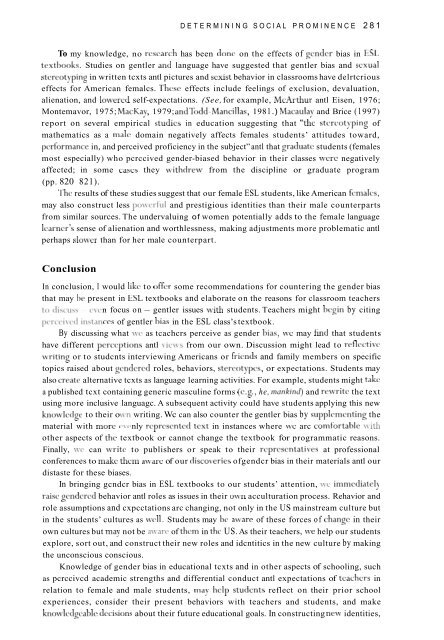Download - Search
Download - Search
Download - Search
You also want an ePaper? Increase the reach of your titles
YUMPU automatically turns print PDFs into web optimized ePapers that Google loves.
DETERMINING SOCIAL PROMINENCE 281To my knowledge, no research has been done on the effects of gender bias in ESLtextlmoks. Studies on gentler and language have suggested that gentler bias and sexualstcrcotvping in written tcxts antl pictures and sexist behavior in classrooms have delrtcriouseffects for American femalcs. These effects include feelings of exclusion, devaluation,alienation, and lowered self-expectations. (See, for example, McArthur antl Eisen, 1976;Montemavor, 1975; MacKay, 1979; andTodd-Mancillas, 198 1 .) Macaulay and Brice (1 997)report on several empirical studies in education suggesting that “thr stcrcotTping ofmathematics as a male domain negatively affects females students’ attitudes toward,performance in, and perceived proficiency in the subject” antl that graduate students (femalesmost especially) who pcrccived gender-biased behavior in their classes wcrc negativelyaffected; in some cases they hvithtlrew from the discipline or graduate program(pp. 820 821).’l’hc results of these studies suggest that our female ESL students, like American females,may also construct less ponwful and prestigious identities than their male counterpartsfrom similar sources. The undervaluing of women potentially adds to the female languagelearner’s sense of alienation and worthlessness, making adjustments more problematic antlperhaps slowcr than for her male counterpart.ConclusionIn conclusion, I would like to offer some recommendations for countering the gender biasthat may I x present in ESL textbooks and elaborate on the reasons for classroom teachersn focus on ~ gentler issues with students. Teachers might begin by citingccs of gentler bias in the ESL class’s textbook.By discussing what ~ ve as tcachcrs perceive as gender hias, ~ vc may find that studentshave different pcrccptions antl vieLvs from our own. Discussion might lead to reflectivehvriting or to studcnts interviewing Americans or fricnds and family members on specifictopics raised about gendcrcd roles, behaviors, stercotypcs, or expectations. Students mayalso creatr alternative tcxts as language learning activities. For example, students might takea published tcxt containing generic masculine forms (c.g., he, mankind) and rewrite the textusing more inclusive languagc. A subsequent activity could have students applying this newkno\vlctlge to their o writing. Wc can also counter the gentler bias by supplcmc~~ting thematerial with more nly represented tcxt in instances where wc arc comfortable \vithother aspects of thc textbook or cannot change the textbook for programmatic reasons.Finally, we can write to publishers or speak to their representatives at professionalconferences to makc them a\vare of our disco\eries ofgendcr bias in their materials antl ourdistaste for these biases.In bringing gcndcr bias in ESL textbooks to our students’ attention, \IC immediatel)raise gcndcrcd behavior antl roles as issues in their ow-n acculturation process. Rehavior androle assumptions and cxpcctations arc changing, not only in the US mainstream culture butin the students’ cultures as \rcll. Students may be avwe of these forces of changc in theirown cultures but may not be a\varc of them in thc US. As their teachers, \ve help our studentsexplore, sort out, and construct their new roles and idcntitics in the new culture by makingthe unconscious conscious.Knowledge of gender bias in educational tcxts and in other aspects of schooling, suchas pcrccivcd academic strengths and differential conduct antl expectations of teachers inrelation to female and male students, ma): help stutlcnts reflect on their prior schoolexperiences, consider their present behaviors with teachers and students, and makekno\vlctlgeablc decisions about their future educational goals. In constructing ne\v identities,


